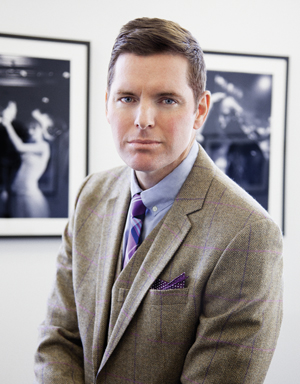Opening Statements
10 Questions: Meet the legal force behind some of the biggest brands in the fashion industry

Photo of Douglas Hand by Len Irish
Q. How did you get hired by so many fashion designers?
A. I've always worked well with creative people. I think it has helped that I have a long-standing interest in fashion and am out and about in the city and LA, interacting with designers. But I think this was important: I wasn't the gallery guy at the gallery opening, or the fashion guy at the fashion show. I was always recognized as "the lawyer," and I was comfortable presenting myself that way and presenting what I do as positive. When you're the only lawyer at a store opening or a fashion show after-party, people remember you. And when a legal issue comes up for them, you're front of mind.
Q. What kinds of work do you do for them?
A. M&A, corporate finance, licensing and brand collaborations, contracts around presentations and shows during fashion weeks—and, increasingly, IT service agreements regarding bringing e-commerce in-house.
Q. The fashion world is notorious for partying, for drugs and addiction—do you ever see that with your clients?
A. Not with any clients that I've known. But it can be a great challenge to get creative people to focus on some of the issues you're putting in front of them. Often, they want you to make decisions for them.
Q. Do you have a favorite fashion-industry deal?
A. Recently we represented the Council of Fashion Designers of America in connection with their acquisition of the Fashion Calendar, an organization that's been calendaring fashion events since the 1950s. As an M&A lawyer by initial training, I appreciated the extreme logic of the deal. It's nice when the synergies in a transaction are so obvious.
Q. You've been photographed and profiled for your own personal style. What will you be wearing this summer?
A. I am a big fan of seersucker used in nonobvious ways. It's a great fabric for summer, and you can throw it into a suitcase and it comes out looking like it's supposed to look: slightly rumpled with creases everywhere. But you can't look like you're pushing an ice cream cart around. You have to look for fabric in colors like navy blue or grey. I've also been known to wear a shorts suit on occasion, taking a cue from one of my menswear clients, Nick Wooster. They're very comfortable in the city, if you can get over worrying about your legs being too pale.
Q. Have you ever considered dabbling in fashion design yourself?
A. No. I certainly know my place when it comes to the divide between creative and linear thought.
Q. Do you have any personal fashion-related goals?
A. Really just advancing American fashion in the way that I can most effectively. That's not going to happen through design or inspiration on style, but from using what I, as a lawyer, have to offer the community. I've been working with the CFDA's incubator program for years, with NYU, Cardozo and Fordham University's fashion law programs and also with the CFDA to re-establish an independent men's fashion week in New York.
Q. What's next for your firm?
A. We'd like to evolve the practice to include some public company work. It would be fantastic to work on an IPO for one of our clients. We do a lot of work with West Coast brands like Rodarte and Band of Outsiders, but we do not yet have a full-time physical presence there, so a West Coast office is something that's in our future.
Q. I'll bet you'll have no shortage of fashionista lawyers applying to work with you.
A. One of the benefits of practicing in this area is that many people are passionate about it, which means we have the ability to get great associates and keep them inspired. I think without exception, they love it here—they get to work with a lot of creative people in industries they care about.
Q. I have to ask: Do lawyers at your firm ever get free clothes?
A. Yes, on occasion. Our associates and partners are invited to all friends-and-family sales and get to buy wholesale at the end of the season. Everyone here gets a steep discount on what our clients make, and we are happy to support them. We are one damn stylish firm!
This article originally appeared in the May 2015 issue of the ABA Journal with this headline: "Style Counsel: With a client list that reads like Vogue magazine, Douglas Hand has become the legal force behind some of the biggest brands in the American fashion industry."



